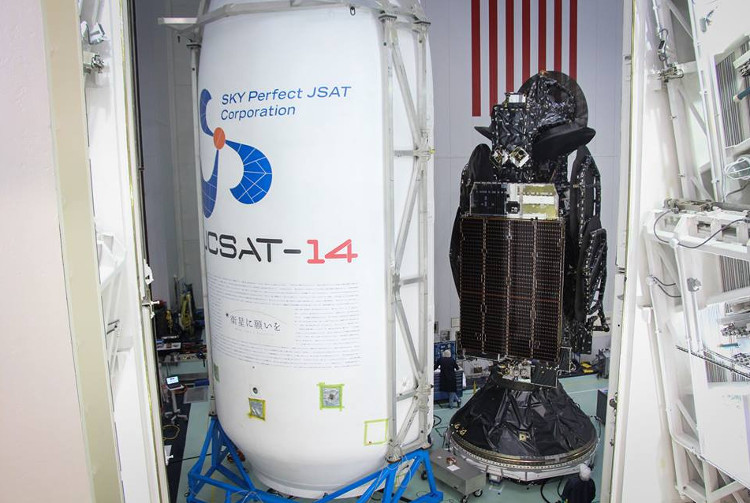SpaceX is about to put Japan's telecommunications satellite into orbit
According to the original plan, SpaceX intends to launch Falcon 9 missiles to bring Japan's JCSAT-14 telecommunications satellite to space, yesterday at 12:21 minutes (Vietnam time). However, due to weather conditions, the launch in Cape Canaveral, Florida (USA) will be conducted this afternoon. As usual, the company will still try to land missiles on an unmanned ship floating in the sea, but SpaceX said it did not expect to successfully implement it in this mission.
In the upcoming mission, the Falcon 9 boosters must bring the JCSAT-14 satellite into a very high elliptical orbit above the Earth's surface - known as a geostationary orbit (GTO) . This is also the reason that SpaceX did not hope to successfully land missiles on self-propelled barges. The company explained: "The first floor of the rocket will have to go through an extreme speed and temperature, so successful landing becomes uncertain." In addition, it takes more fuel to send the rocket to the GTO point, compared to launching it to a lower orbit like some of the previous missions. Falcon 9 needs to reach a higher speed to be able to reach a higher orbit, so it is easy to understand when it takes more fuel for this process. And yet, that also makes the amount of fuel left for the return of missiles not much.

Bringing the satellite JCSAT-14 into orbit is SpaceX's mission in this new mission.
Earlier in April this year, SpaceX finally succeeded in landing missiles on floating barges on the ocean, after a lot of effort but failed. It also marks the second time the company can land missiles on Earth, after completing the task. The first time was in December last year. In his speeches, SpaceX also explained that a land landing was only suitable for some missions, while landing on unmanned ships which had more advantages, in the Mission requires missiles to reach high altitudes as well as great speeds. The company will need to master both techniques if it wants to recover and reuse missiles as much as possible.
Although not expecting a successful landing, Elon Musk and SpaceX fans have the right to trust their success. The JCSAT-14 satellite, when in operation, will provide telecommunications waves to Japan and some regions in Asia-Pacific.
- Successfully launched the AsiaSat 6 satellite rocket into orbit
- SpaceX successfully launched the SES-9 satellite into orbit, failing to land missiles on barges
- SpaceX successfully launched 10 Iridium Next satellites into space
- American private company launched the first commercial satellite
- SpaceX intends to launch 42,000 satellites into space
- SpaceX launched the third satellite in just ... 2 weeks
- 1,000 Vietnamese days in the world orbit
- SpaceX has gone down in history with the highly successful Falcon 9 reusable missile launcher
- The launch of the Falcon 9 rocket landing succeeds but SpaceX destroys the secret Zuma satellite
- Eutelsat 3В telecommunications satellite successfully launched into orbit
- The missile Ariane brought two telecommunications satellites into orbit
- Russia successfully launched the Express-AM8 telecommunications satellite
 Van Allen's belt and evidence that the Apollo 11 mission to the Moon was myth
Van Allen's belt and evidence that the Apollo 11 mission to the Moon was myth The levels of civilization in the universe (Kardashev scale)
The levels of civilization in the universe (Kardashev scale) Today Mars, the sun and the Earth are aligned
Today Mars, the sun and the Earth are aligned The Amazon owner announced a secret plan to build a space base for thousands of people
The Amazon owner announced a secret plan to build a space base for thousands of people